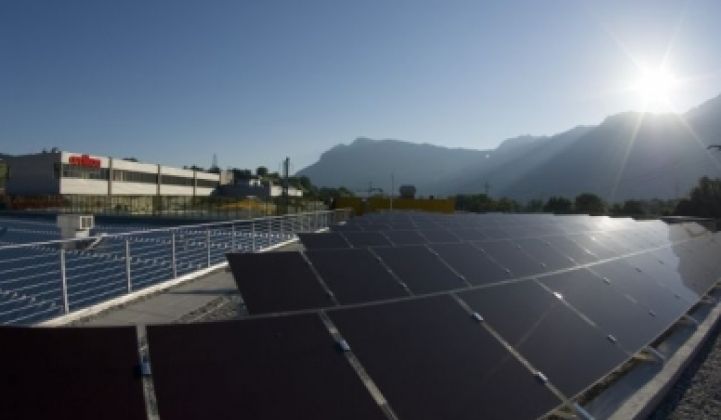Intersolar kicked off in Munich Wednesday, and lots of solar companies are announcing new products, deals and research results. Solar stocks trading in the U.S. exchanges are all experiencing a lift in their share prices, including those from First Solar, SunPower, Suntech Power, Trina Solar, Akeena Solar and Evergreen Solar.
Here is a roundup of the news from the conference:
Oerlikon Solar
The Swiss solar factory equipment maker said test results from its pilot line showed that its second-generation equipment could produce amorphous silicon solar panels with 11 percent efficiency. That means the cells in the panels can convert 11 percent of the sunlight that hits them into electricity.
Crossing the 10 percent threshold is critical for emerging solar technologies to demonstrate that they can be competitive in a marketplace where most of the solar panels use crystalline silicon as the key ingredient for power generation.
First Solar stands out as the non-crystalline silicon panel maker by keeping the costs of producing its cadmium-telluride products very low ($0.93 per watt). The Tempe, Ariz.-based company achieved 10.9 percent efficiency with its panels during the first quarter of this year, the company said.
Oerlikon said the new efficiency results would enable it to roll out equipment that could produce panels at a cost of $0.70 per watt by the end of 2010. Now, the 11 percent efficiency is the best result from a limited production, so it might not be what its customers could get in mass production. The second-generation equipment deposits a layer of amorphous silicon and a layer of microcrystalline on glass during panel production. The first-generation equipment only makes panels with a single layer of amorphous silicon, the semiconducting material for converting sunlight into electricity.
Fat Spaniel Technologies
Software developer Fat Spaniel Technologies has teamed up with a satellite data provider Meteotest to provide meteorological information, such as solar radiation data, available to solar power plant operators. San Jose, Calif.-based Fat Spaniel plans to make the service available to its European customers first, the company said.
Fat Spaniel develops software that allows solar energy system owners to monitor their installations' performances over the internet. The company said its software could diagnose problems and track power output of each panel in the system. The company is targeting residential and commercial solar markets.
The company has been boosting its offerings by working with communications equipment. Fat Spaniel recently said it would market its service with Satel, a Finnish wireless equipment maker, in Spain.
The deal with Meteotest, based in Switzerland, would add new content offerings from Fat Spaniel.
SolarEdge
SolarEdge, which develops electronic devices and software for monitoring and improving solar panel performances, said BP Solar has agreed to check out SolarEdge's products and maybe integrate them into BP's solar panels some day.
SolarEdge, based in Israel, is one of a growing number of companies developing products that aim to increase electricity production from each panel in a system. Currently, a solar energy system is strung together in a way that a poor-performing panel would affect the energy output of the rest of the panels in the system. So the overall power output of a system could be much lower. Shading and dust are some of the chief culprits for causing some panels to produce less power than they should.
SolarEdge's approach to fixing this problem is to embed each solar panel with its electronic device for harvesting power before the power is sent to a centralized inverter for converting from direct current to alternating current for the grid. The company also sells the centralized inverters.
Some of the alternative approaches fashioned by the company's competitors include getting rid of the centralized inverter in favor of microinverters that are attached to each solar panel. The microinverters would monitor and get as much power out of each panel before doing the DC-to-AC conversion. SolarBridge Technologies and Enphase Energy are two startups developing microinverters.
Regardless of the methods, all these companies would like to see their products built into solar panels instead of adding them to the panels at the job site. Integrating these power-harvesting and monitoring devices would simplify the design of a solar energy system and reduce installation time and labor costs.
National Semiconductor
National Semiconductor (NYSE: NSM) has developed an electronic device for coaxing more power out of each solar panel. The long-time power management chip company formally announced the product launch at Intersolar even though it had been discussing it publicly for nearly a year.
The Santa Clara, Calif.-based company signed a memorandum of understanding with large Chinese solar panel maker Suntech Power, which plans to evaluate National Semi's SolarMagic and decide whether to do joint marketing or product development. Suntech also has a deal with Enphase Energy to market Enphase's microinverters to Suntech's network of dealers in the United States.
National Semi also said field trials conducted within the last two months by HaWi Energietecnik in Germany showed that SolarMagic devices could recoup 54.4 percent of the energy that would otherwise be lost because of shading. A solar energy system could produce 50 percent less power even if only 10 percent of it is under the shade, the company said.
Like SolarEdge, National Semi's SolarMagic focuses on getting more DC power from each panel rather than doing the DC-to-AC conversion at the panel level.
Another company, Tigo Energy, also is developing devices and software to improve power production of each solar panel. The Los Gatos, Calif.-based startup just raised $10 million for a second-round of funding.
Join experts and influencers at Greentech Media's Growth Opportunities in the New PV Market: Projects, Finance and Policy in San Francisco on July 13.




